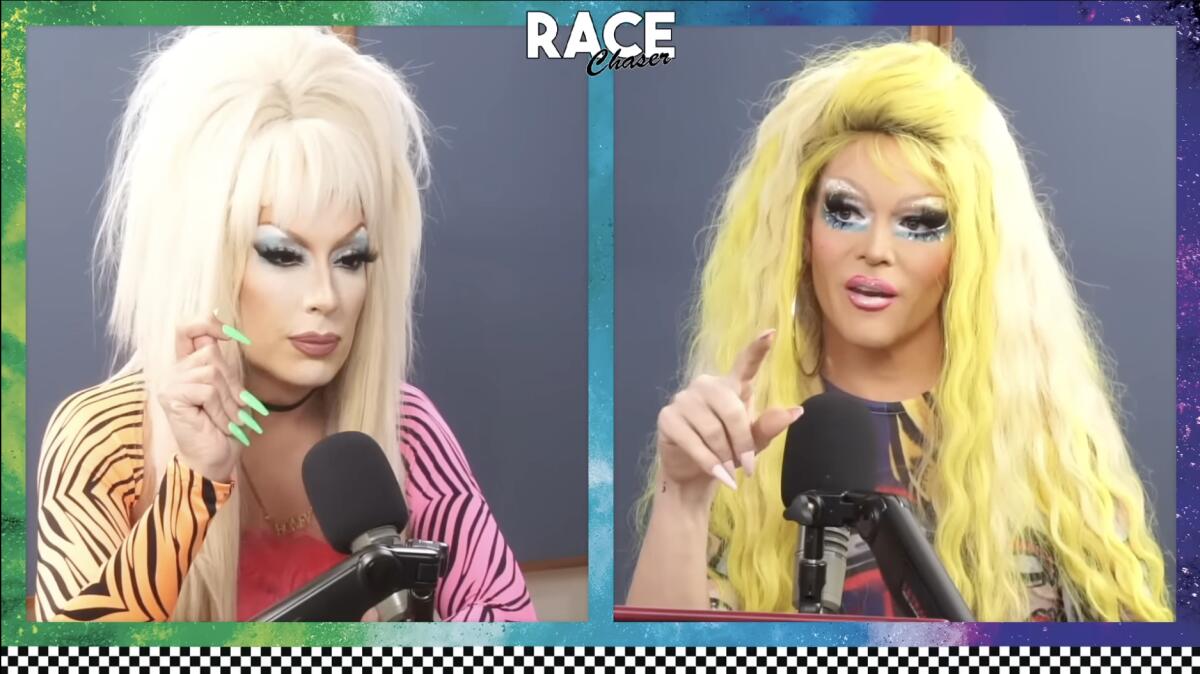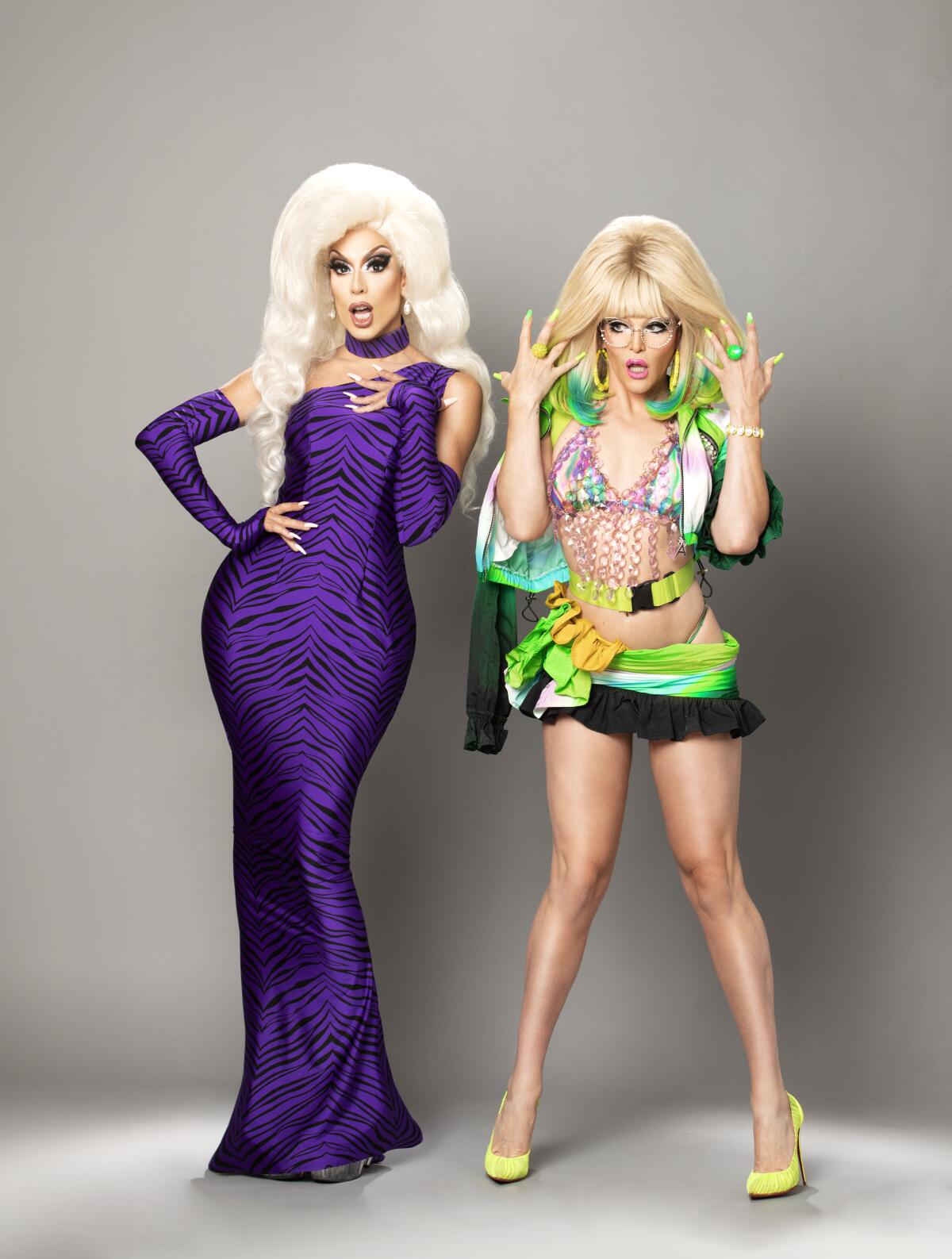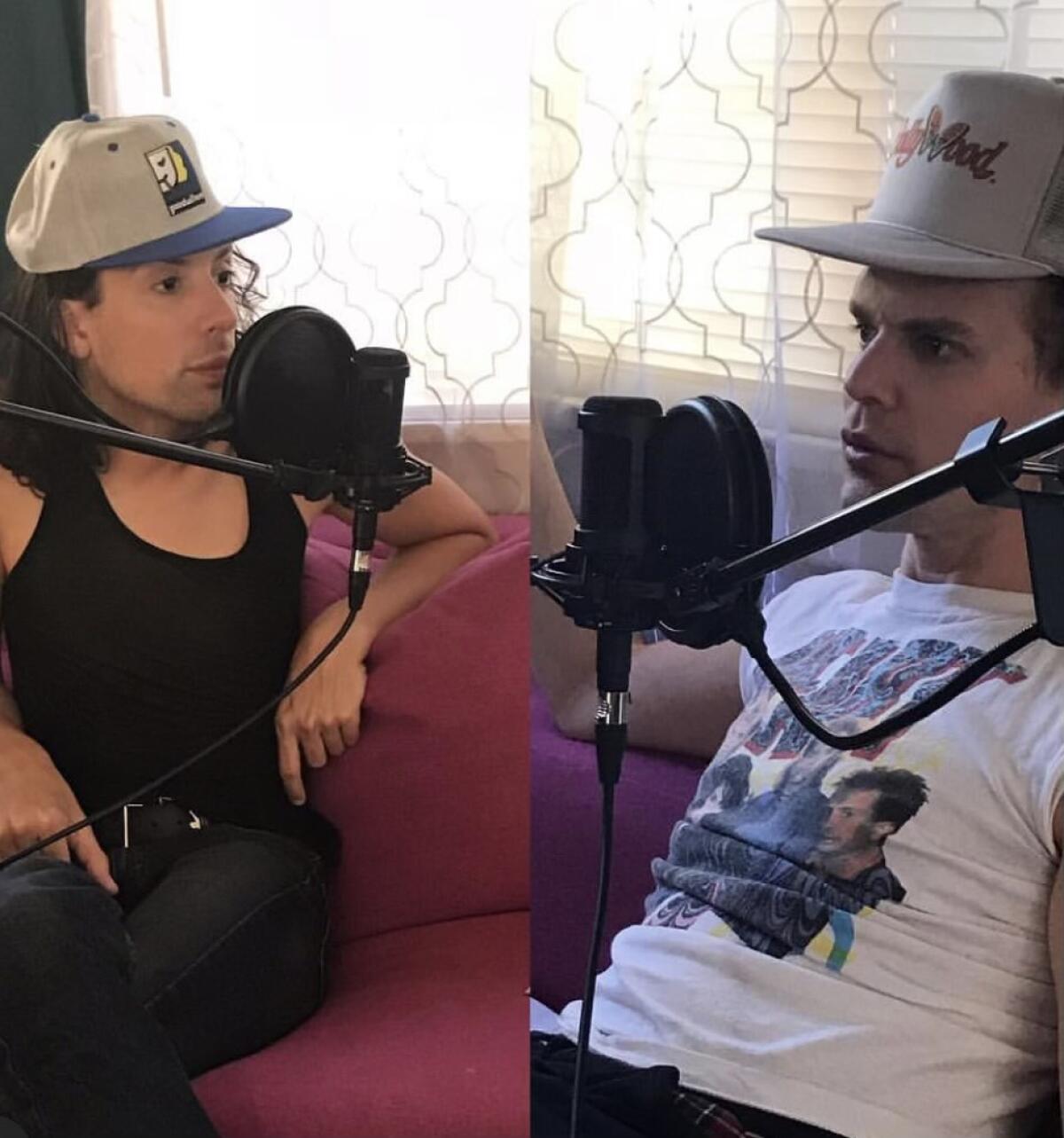L.A. queens fight the attacks on drag with their own hit podcast network

- Share via
If you happen to be searching through Apple or Spotify for parenting podcasts or maternal advice and you come upon the MOM podcast network, keep scrolling, mama — that is, unless you’re looking to laugh away a long day and have some LGBTQ+ learning moments.
MOM stands for Moguls of Media, and despite the name, family-friendly it is not. It is about chosen families, though, with a bodacious brood serving big wigs, glossy lips and raunchy quips on culture, entertainment and hot gossip.
MOM is an all-drag podcast network, and it has become must-stream listening with programs such as “Race Chaser” (a chat show centered on “RuPaul’s Drag Race”) and “Hi Jinkx” (an interview show hosted by former “Drag Race” winner Jinkx Monsoon). MOM programs rank among the top 50 film and TV podcasts on Apple and Spotify, and on YouTube they have pulled in more than 50 million views. Their hosts have a combined following of more than 10 million across TikTok, Instagram and X.
While conservative campaigns against drag story time readings and censorship of Scholastic Book Fairs are making headlines, stirring fear about a backlash against LGBTQ+ speech, the podcasting space has emerged as a place for these voices to be heard loud and clear.
Fans of drag know about performers’ powers of timing, delivery and observational storytelling. Comedians like Marc Maron, Joe Rogan and Burt Kreischer have long been dominating the podcast space, but the idea of showcasing drag queens in a similar fashion was a novel concept when drag queens Willam and Alaska Thunderf— 5000 came up with MOM in 2018. Their gift of gab was obvious, but drag’s emphasis is mostly on visual elements — hair, makeup, glamorous thematic fashion — so podcasts seemed counterintuitive.
But the Emmy Award-winning reality competition “RuPaul’s Drag Race” poked holes in that assumption. In addition to runway walks and lip-sync bouts, it features mini challenges that require acting ability, quick-witted charisma and, significantly, the ability to “read” (bitingly insult) one another in a way that rings true, even at its most ridiculous.
Both MOM moguls are known as reading royalty, in addition to being former “Drag Race” contestants. Alaska was a beloved runner-up on Season 5 and won the subsequent year’s “All-Star” competition, and Willam appeared on Season 4 and remains one of the most notorious contestants in the show’s “herstory” (as they call it), earning the distinction of being its first disqualified cast member. The official explanation was that he broke the show’s conjugal visit rule with his husband at the time, but over the years, and especially on his podcasts, Willam has alleged that he wanted off the show and knowingly broke rules to avoid what he described as ill treatment by some of the crew.

“Race Chaser,” the podcast that started it all, was created as a recap of “Drag Race” to watch in tandem with each season. “Hot Goss,” the pair’s weekly chat show covering trending topics, politics (“politiques”), entertainment and new music (including a weekly segment called “Rainbow Spotlight” that premieres songs by queer artists) came later and quickly became equally popular.
“We were leaving Burning Man and we were stuck in a line for nine hours and we only had one podcast to listen to that Alaska downloaded called “Out on the Lanai,” which was ‘The Golden Girls’ follow-along show,” Willam said during a recent group video chat about MOM’s origin. “I was like, ‘Oh, this is cool, it’s like a behind-the-scenes thing, and I thought we should do a show like it.”
“Drag Race” was a no-brainer to dissect, as the two stars could spill behind-the-scenes tea, talk ensembles and styling, and generally celebrate the art of drag and those in their community. The podcast is a hit thanks to its uncensored commentary and scorching “shade,” while still maintaining a spirit of positivity and joy. Listeners also are treated to a running list of great drag names (including recent faves Bonnie Irate and Phyllis Inn).
“Our motto is we keep it cute, but we tell the truth,” Willam said. “I do not need to hear what some man who doesn’t do drag thinks about ‘Drag Race’ during a review podcast. I need drag queens and even better, drag queens who have been through the system like us, like Bob [The Drag Queen] and Monet [X Change]. We’ve all been there and we know how rigged and wonderful it can be at the same time.”
It’s no secret that reality shows, from “Keeping Up With the Kardashians” to “Survivor,” are only as real as the producers choose to let them be. Choices are made in editing. Showrunners shape stories they want to tell.
“We know the gears that are turning in the background,” Alaska said. “And now the audience knows too, because they’re a very smart audience, and they pay attention to the show. So we’re really talking about that. And we’re talking about what the journey must be like for all the queens going through it.”
MOM’s lineup features some of the most famous drag queens in the business, representing diverse ethnic backgrounds and bringing different cultural conversations into their shows. The early lineup included “Very Delta” hosted by Delta Work, and “The Chop” with Latrice Royale and Manila Luzon. “Very That” features Raja Gemini and Delta, and “Sloppy Seconds” has Dipper and L.A.’s own Meatball, a comedian best known for appearing on the “Boulet Brothers Dragula” competition and for satirizing embattled New York Rep. George Santos in a recent club performance that went viral on TikTok.
Newer shows such as “Hi Jinkx” and “Hall & Closet” (hosted by “Drag Queen” Season 12 winner Jaida Essence Hall and Miss Congeniality of Season 12, Heidi N Closet) solidified the drag network’s dominance.
“We live in a time with lots of problems and few solutions. Lawmakers and politicians hear our problems but don’t listen to them,” Delta Work said. “It seems like we are lost in a flurry of social injustice with no clarity. ‘’Very Delta’ is a space where we acknowledge that there are ‘bigger fish to fry’ in this world, but for an hour the small fish we do fry can bring us comfort. “

Alaska said MOM was born from the pandemic.
“Podcasts became like, sort of a lifeline for us to all stay sane,” Alaska said. “We had a regular thing to do, and we were able to stay connected with people.”
Though the MOM studio is in Los Angeles, many queens record their shows remotely, something non-drag producer Big Dipper said contributed to the network’s popularity, especially during COVID.
“During the pandemic, there was an opportunity for audio programming from drag entertainers, which was a unique moment where queens didn’t have to get fully in drag to connect with their fans,” Dipper said, adding that things are changing now. “The industry has started to shift, and now when you say podcasts, there’s a visual component. … Podcasting was originally all radio but now we shoot video content for our shows in the L.A. studio too.”
MOM content is generally R-rated, along the lines of the bawdy banter heard on “The Howard Stern Show” or on stand-up comedy pods, and few topics are off limits. Alaska’s mega-vocal fry fabulousness and Willam’s deadpan sass and signature slang play off each other as they discuss their personal lives and news of the day. On the “Hot Goss” pod, the show-ending segment, “Diving Into the DMs,” is particularly immersive, giving fans a chance to ask the hosts anything as they encourage sexy selfies for on-air reading consideration.
And the network continues to grow. MOM now offers three tiers of special subscriber services ($5, $20 or $50 a month) granting access to bonus content, ad-free episodes, video and presale ticketed events. The network also held a special live version of the show in New York that sold out.
Willam, an actor and singer who has appeared on Ryan Murphy’s “Nip/Tuck” and the hit web series “Eastsiders,” said he hopes to build a MOM “fempire” that expands into other facets of media, such as movies and commercials. He is performing in New York in a “Titanic”-themed musical called “Titanique,” while Alaska has been filming comedy specials, hosting pageants and recording music. Alaska’s next big production is an hommage to Lady Gaga’s “Artpop” at the Regent on Nov. 6.
Other MOM queens seem just as busy. Delta Work regularly hosts drag brunches and stage shows at Hamburger Mary’s and Executive Suite in Long Beach. Jinkx Monsoon has a big holiday tour coming up with drag singer BenDeLaCreme hitting the Dolby Theater in L.A. on Dec. 16. “Drag Race” and WOW may have given these dynamic divas a platform, but MOM is giving them a voice.
“That was the mission from the beginning,” Dipper said. “When we started this, Alaska and Willam wanted to make sure that the queens’ voices were heard, but also that they were compensated and that they felt ownership over the content.”
Delta Work sees herself as part of a collective, a family.
“The MOM network is important now more than ever because drag has so many facets and drag entertainers have so many viewpoints,” Dipper said. “We need ‘mothers’ of drag providing an outlet for other moms. ... We need all of these voices.”
More to Read
The biggest entertainment stories
Get our big stories about Hollywood, film, television, music, arts, culture and more right in your inbox as soon as they publish.
You may occasionally receive promotional content from the Los Angeles Times.










